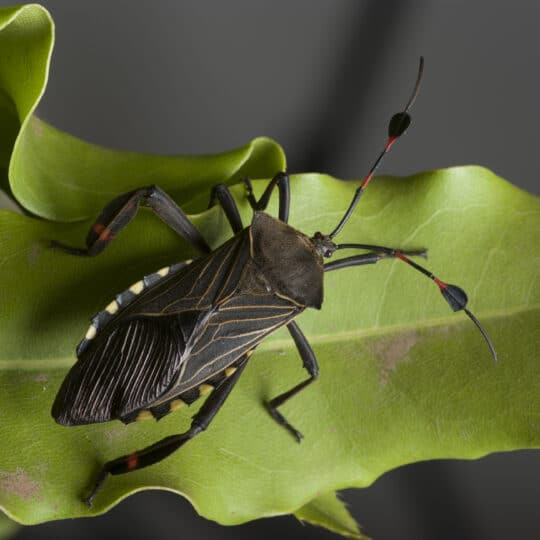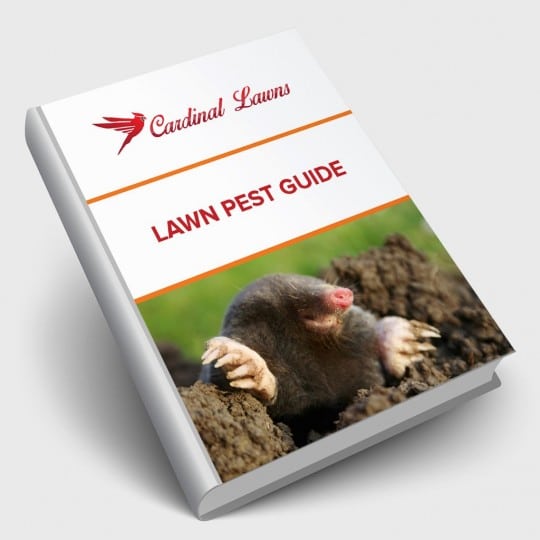Pest Spotlight: Chinch Bugs
How to Identify, Treat & Prevent
Posted
June 27, 2024

During the hot, dry summer, there are many reasons your lawn can turn brown. But for warm-season grasses that tend to weather the sweltering weather, there’s one more reason to consider. Chinch bugs. These tiny insects can cause big problems for your lush lawn. Professional chinch bug control helps keep your grass strong this season.
Identifying Chinch Bugs
Chinch bugs are a common pest in many lawns, especially those with St. Augustine grass, zoysia, and other warm-season grasses. These small, black-bodied bugs have white wings and thrive in hot, dry conditions—making them more active during the summer.
Not only do chinch bugs suck the sap from grass blades, but then they inject a toxic saliva that prevents the plant from transporting water. This leads to brown spots of dead grass scattering across your lawn.
In order to effectively treat and prevent chinch bugs from destroying your yard, you need to first properly identify the bug. Here are some common signs to look for:
- Yellowing grass blades
- Irregular brown patches that expand over time.
- In severe infestations, you might see chinch bugs at the base of grass blades, especially on sunny days.
If you start to notice signs and want to confirm a chinch bug infestation, use the flotation method:
- Cut both ends of a coffee can.
- Insert one end into the soil.
- Fill it with water.
- Wait for 5-10 minutes.
- If chinch bugs are there, they’ll float to the surface.
Once you’ve identified the culprit, you can work to successfully evict them.
Chinch Bug Control Options
There are a few ways you can get rid of chinch bugs. Some methods are more eco-friendly that others. As with any pest control problem, it’s best to follow any product instructions for safe, proper use. Target infested areas first instead of a broad spectrum application.
- Neem oil is a natural pesticide you can spray on affected areas to repel and kill chinch bugs.
- Diatomaceous earth is a non-toxic powder that can be applied to the lawn. It works by dehydrating and killing chinch bugs on contact.
- Insecticidal soaps are effective against chinch bugs when used properly and have minimal impact on beneficial insects.
- Granular or liquid insecticides can be used when other methods prove ineffective. Water in granular products for better contact. Liquid products are typically sprayed directly on affected areas. Just be aware that some chemicals may also kill surrounding grass and plants.
No matter what treatment option you chose, timing is always important. Apply products in the early morning or later afternoon when bugs are most active.
Pest Prevention Methods
Preventing a chinch bug infestation is easier and more cost-effective than dealing with a severe outbreak. Here’s how you can help stop chinch bugs before they become a problem.
- Maintain your lawn. Regular mowing, watering, and fertilizing can keep grass healthy and less susceptible to pests.
- Proper watering practices. Deep, infrequent watering sessions are better for healthy root growth than shallow, frequent watering.
- Manage thatch. Chinch bugs are often found at the base of grass blades, an area that can accumulate layers of dead grass and roots. Dethatch your lawn regularly with a heavy rake to make it less desirable for pests.
If you’ve tried preventative measures and still find yourself having to resort to control methods, it’s time to take a professional route.
Professional Chinch Bug Control
You deserve to enjoy your lawn more than pests do. Don’t let them take over. You can leave all the yard work to a lawn care company like Cardinal Lawns. Not only can we help you maintain your lawn and manage thatch, but we can also help you get rid of pests like chinch bugs. All you have to do is make a call to 614-808-4446. We’ll evaluate the current conditions in your yard and come up with a plan that’s good for you and bad for bugs. Then all you have to do is enjoy your lush, green lawn free from the destructive effects of chinch bugs.

Download Your FREE Lawn Pest Guide
Pests become most prevalent during the heat and humidity of summer. Take some time to learn about the signs of infestations before any damage can be caused to your landscape. This handy guide will teach you how to spot common lawn pests and how to keep them from causing harm to you and your property.